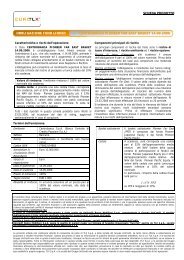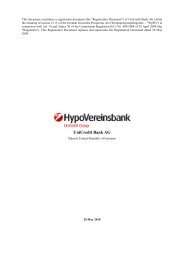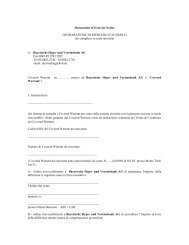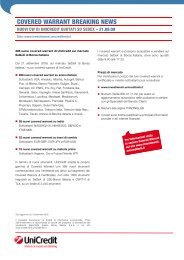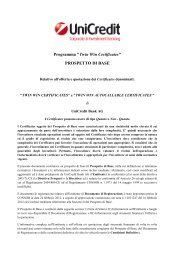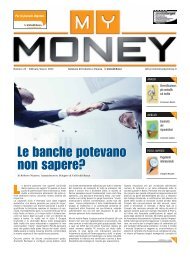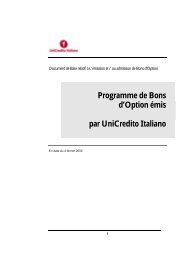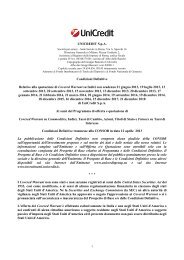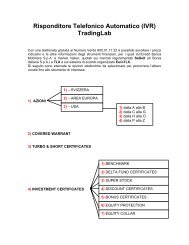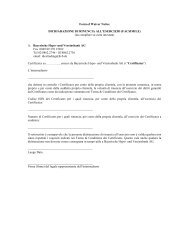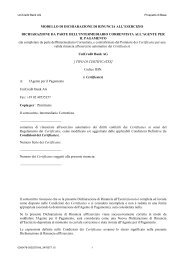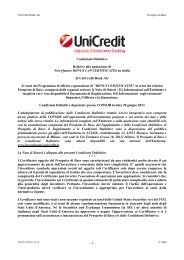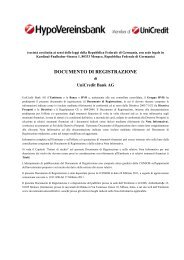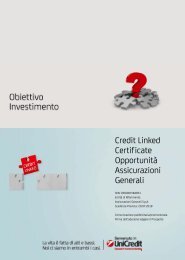HVB DIP 2006-Title Summaryv13.DOC - UniCredit
HVB DIP 2006-Title Summaryv13.DOC - UniCredit
HVB DIP 2006-Title Summaryv13.DOC - UniCredit
Create successful ePaper yourself
Turn your PDF publications into a flip-book with our unique Google optimized e-Paper software.
34<br />
Certificate and such valuation date. Even if the underlying asset performed well in the period prior to the valuation<br />
date but only decreased on such valuation date the calculation of the redemption amount would only be<br />
based on the valuation date. Especially for underlying assets showing a high volatility this may lead to a redemption<br />
amount being significantly lower than the value of the underlying asset prior to the valuation date might<br />
have suggested.<br />
Risk-Hedging Transactions<br />
Holders of Certificates may not be able to make transactions to preclude or limit risks at all times during the term<br />
of the Certificate. Their ability to do so will depend on market conditions and the underlying terms and conditions.<br />
In some cases investors may be able to make such transactions only at a market price that is disadvantageous<br />
to them, so that a significant loss would be incurred.<br />
Open-End Certificates<br />
Open End Certificates give their holder an entitlement to the payment of a redemption amount or to the delivery<br />
of an underlying asset on redemption dates or termination dates to be decided by the Issuer. No automatic payment<br />
of the redemption amount, or automatic delivery of the underlying asset is specified for any date. In order<br />
for payment or delivery to take place, either the bearer of the Certificate must redeem the Certificate in accordance<br />
with § 3 of the applicable Certificate terms and conditions, or the Issuer must terminate the Certificate in<br />
accordance with § [4][5] of those terms and conditions. Because the Issuer has a right to terminate, the term of<br />
open-end Certificates may be truncated. In that case, there can be no assurance that the price of the Certificate<br />
will recover before the termination date. Payment of the redemption amount or the delivery of the underlying<br />
asset is based on the trading price or the value of the underlying interest on one or more dates stated in the Certificate's<br />
terms and conditions.<br />
Certificates with Early Termination Rights<br />
When the Issuer has an early termination right, the term of Certificates may be truncated at the Issuer’s discretion.<br />
In that case, there can be no assurance that the price of the Certificate will recover before the termination<br />
date.<br />
Certificates with Extension Option<br />
For Certificates with an extension option, the Issuer has the right to postpone the maturity date by several months<br />
or years on one or more occasions. However, there can be no assurance that the Issuer will exercise its right to<br />
extend the maturity date if the Certificate's value has deteriorated.<br />
Risks Relating in particular to Warrants<br />
General<br />
Warrantholders should take the following into account:<br />
– The price performance of Warrants is linked to the performance of an underlying interest (a share, a<br />
share basket, an index, an index basket etc.).<br />
– A change in trading price, or even the non-occurrence of an expected change in trading price, and the<br />
volatility of the underlying interest, as well as changes in interest rates, may disproportionately affect the price of<br />
the Warrant relative to the capital invested, to the point of rendering the Warrant valueless.<br />
– Holders of a Call Warrant may be exposed to the risk that the value of their Warrant may decline to<br />
the point where their invested capital (the price paid for the Warrant) will be lost entirely if the trading price of<br />
the underlying interest falls.<br />
– Holders of a Put Warrant may be exposed to the risk that the value of their Warrant may decline to the<br />
point where your invested capital (the price you paid for the Warrant) will be lost entirely if the trading price of<br />
the underlying interest rises.<br />
– Share Warrants and Share Basket Warrants do not carry dividend protection. Dividend discounts may<br />
therefore adversely affect the price performance of a Call Warrant, because they reduce the trading price of the<br />
associated Share.<br />
– If the established trading price of the underlying interest is above (in the case of a put) or below (in the<br />
case of a call) the exercise price indicated in § 1 (1) of the Terms and Conditions (Warrants), or if the exercise<br />
price is identical with the established trading price of the underlying interest, the price of the Warrant will be<br />
determined on the basis of the fair value. Fair value is affected by the declining time to maturity, and the associated<br />
declining probability that the Warrant can be exercised. Accordingly, the price of the Warrant will decline<br />
to zero by the last day of the term of the option right such Warrant represents, and this decline in value of the<br />
Warrant will accelerate toward the maturity date.



